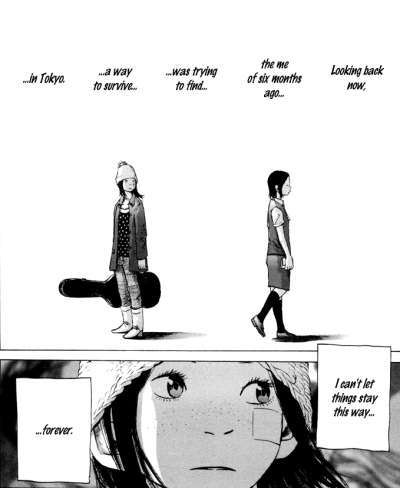
Also by this author: A Girl on the Shore, Goodnight Punpun, What a Wonderful World!
My Thoughts
Meiko is a college graduate that has been feeling unsatisfied with her life. She has an office job that she doesn’t care for and a live-in boyfriend that works part-time and regrets never being successful with his music career. Meiko struggles with the feeling that she has stagnated, at that point between college and adulthood, having nothing that she feels passionate about. Solanin is the story of discontented youth that is painfully relatable for many young people in the modern age.
“The way I look at it, adults are just a bunch of people who go ‘whatever’ to everything.”
 This manga was incisive in the way that it explores what it means to grow up and the tragedy of letting go of one’s teenage dreams. The main cast of characters feels like they are simply drifting along with their circumstances, aching to be ‘free’ but conceding to the necessities of work. Meiko feels bored, but no matter what decision she makes to try and free herself, she finds that she’s no freer of boredom. The characters grapple with what it means to be anti-establishment and desperately hold onto their college days.
This manga was incisive in the way that it explores what it means to grow up and the tragedy of letting go of one’s teenage dreams. The main cast of characters feels like they are simply drifting along with their circumstances, aching to be ‘free’ but conceding to the necessities of work. Meiko feels bored, but no matter what decision she makes to try and free herself, she finds that she’s no freer of boredom. The characters grapple with what it means to be anti-establishment and desperately hold onto their college days.
The first volume of this manga was really great, and I like the way that it talks about contentment, regret, and settling down. The second volume became a bit cheesy to me, focusing more on a heartfelt musical underdog story that I got a bit bored with. The epilogue chapter, which was published a decade after the completion of the series provided some closure that I could feel satisfied with. The epilogue takes place a decade after the events of the manga and shows where the characters ended up, and it continues the narrative of growing up and settling down, it was the missing piece of the puzzle that was needed in the original series.
Also notable is that when I was reading I kept thinking about Asian Kung-Fu Generation and hearing their music in my head when I imagined Rotti playing music. I was surprised to find after finishing that there was a live-action movie, and guess who performed the theme song?
Solanin is a great story for young adults that perhaps find themselves in the same rut, struggling with the prospect of settling down and leaving their wild youth behind. Asano writes these themes in a way that is intuitive and fun, with a level of understanding that can only come from someone that has felt that same discontent and yearning for freedom.
